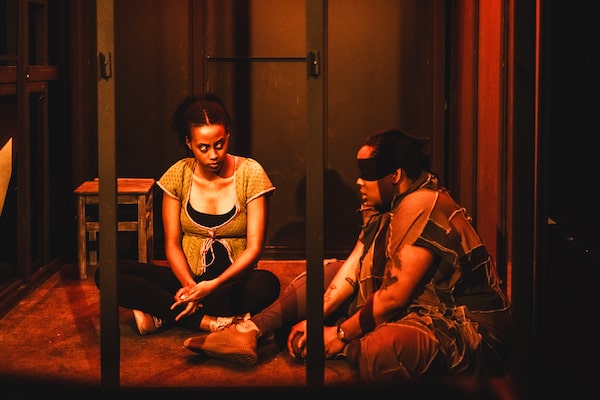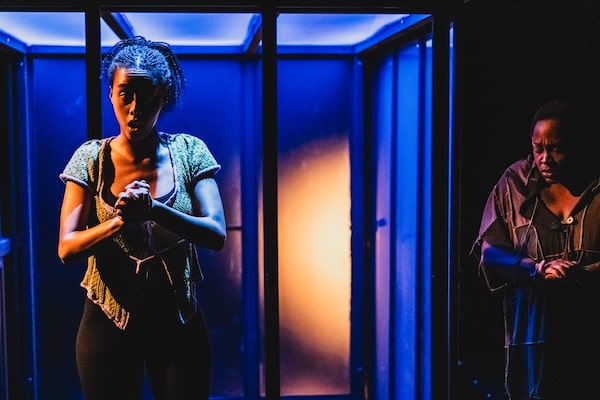
Megan Legesse and Uche Ama in 3 Fingers Back.Jae Yang/Tarragon Theatre
Keep up to date with the weekly Nestruck on Theatre newsletter. Sign up today.
- Title: 3 Fingers Back
- Written by: Donna Michelle St. Bernard
- Directors: Cole Alvis and Yvette Nolan
- Actors: Uche Ama, Tsholo Khalema, Megan Legesse, Indrit Kasapi, Christopher Bautista
- Company: Tarragon Theatre with lemonTree
- Venue: 30 Bridgman Ave., Toronto
- Year: To March 24
When binary, us-versus-them thinking reigns in times of war, the most radical act anyone can do is to be kind.
3 Fingers Back, by award-winning playwright Donna Michelle St. Bernard, is enjoying its world premiere at Tarragon Theatre (March 6-24). It is a joint Tarragon Theatre and lemonTree production with the renowned director Yvette Nolan and rising star Cole Alvis at the helm. St. Bernard ventures into the darkest corners of humanity and implores the audience to consider our collective values and how we treat one another.

Tsholo Khalema and Indrit Kasapi.Jae Yang/Tarragon Theatre
In this production of two short plays, the first, Give It Up is a story inspired by the use of girl soldiers during the civil war in Guinea-Conakry featuring Yol (Uche Ama) and Ada (Megan Legesse). Both imprisoned revolutionary fighters, part of an army of “Sarahs” ready to birth nations, were caught before completing their mission. Dehumanized as fighters and now prisoners, they struggle to connect as humans. A young soldier, Saad (Tsholo Khalema), often fetches Yol for torture. There is almost no graphic physical or sexual violence depicted, only the aftermath, where the women endeavour to find comfort and safety in a place sorely lacking both.
For more than an hour, the staging forces the audience’s gaze to the right of the stage in the cell where the actors are detained. It effectively creates a shared sense of incarceration and disorientation through confinement as we parse the limited information overheard from our cellmates. With both their cause and leader ambiguous, the only things we can be sure of are that these women are young, without family, and escaping abuse. The circumstances of their lives have rendered them vulnerable to the exploitation of the movement’s leader.
The second half, The Smell of Horses, was inspired by Angola’s fight for independence. It’s a repetition of the first, but instead of the “Sarahs,” we meet their captors and see everything that was initially out of frame. Saad, who seemed to be wet behind the ears as a child soldier, is pulled into the power struggle between his superiors, the sadistic Beech (Indrit Kasapi) and the smooth wannabe funny guy Adam (Christopher Bautista). The set design (by César El Hayeck) is large and mobile, creating a space in the small theatre for the men to move freely about. However, it’s also cumbersome and oppressive, holding the soldiers prisoner to the military and its violent desires.

St. Bernard forces us to remember the fingers pointing back at those of us standing in judgment.Jae Yang/Tarragon Theatre
St. Bernard allows viewers to safely point a finger in judgment at the captors, and at times even the captives. Through countries fighting for independence of colonial rule, St. Bernard reveals a complex system of power, one that pits governments against their people and thrives on the conflict of citizens taking up arms against their neighbours. Women and children are always the most vulnerable to abuse and exploitation. As we learn more about the characters, we can perceive a resonance with situations at home, as Indigenous people fight for their independence. The power dynamics resemble our work spaces, the hallowed halls of academia, even our personal lives. In asking us to bear witness, St. Bernard turns our attention to ourselves to ask how we experience these systems, who benefits from them, and how.
The queer-led show’s cast is composed entirely of people of colour, many of whom are members of the LGBTQ+ community. Together, they offer a nuanced representation of people fighting for independence and remind us that this process is messy, non-linear, and it doesn’t fit into any binaries. With care, love, and respect, Nolan, Alvis, and cast cover the difficult realities of oppressed people further oppressing others.
Though there were a few moments during 3 Fingers Back when the acting veered perilously close to melodrama, and the set, at times, felt excessively oppressive, the clever structure of the play overpowered all of that, as did the brilliance of the text and the standout performances by Tsholo Khalema, Uche Ama, and Christopher Bautista.
3 Fingers Back is the most recent example of St. Bernard’s creativity and fierce intellect as a playwright. She creates a portrait of a world that is impossible not to point at while forcing us to remember the fingers pointing back at those of us standing in judgment.
In the interest of consistency across all critics’ reviews, The Globe has eliminated its star-rating system in film and theatre to align with coverage of music, books, visual arts and dance. Instead, works of excellence will be noted with a critic’s pick designation across all coverage. (Television reviews, typically based on an incomplete season, are exempt.)